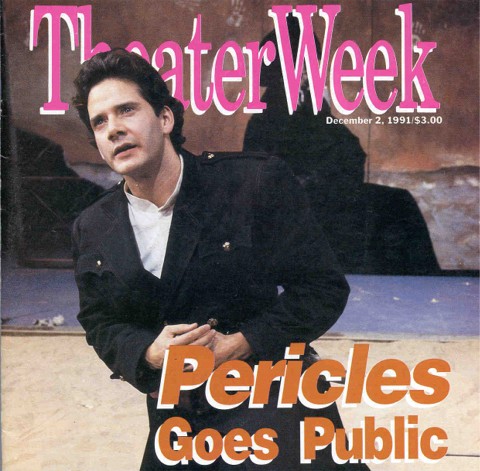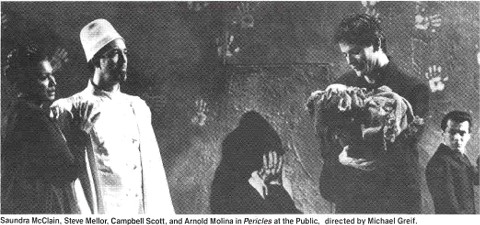
by M. Elizabeth Osborn (contributed by Grace)

Pericles is one of the most beautiful plays ever written. Its fifth-act
recognition scene, bringing together a Pericles reduced to abject despair
and the daughter he believes dead is among the most moving moments in dramatic
literature. On the stage I have never known it to fail.
In the theatre -- or even rereading it on the subway -- it is the only
scene I know that invariably brings me close to tears.
Writing this is important to me because the standard
judgement of the play is, to put it mildly, rather different; the first
sentence the Arden editor lays on us is: "No one would include Pericles
among
Shakespeare's masterpieces." Now I'm not saying that Pericles
is better than Hamlet or Lear. I am saying that there
are plenty of "masterpieces" -- Romeo and Juliet, Macbeth,
The
Tempest among them -- I've never been able to love as I love this first
of Shakespeare's romances, in which he creates an altogether new kind of
drama.
The story of Pericles, Prince of Tyre, very likely
goes back to the romances of the ancient Greeks; it was widely known for
many hundreds of years. The play was popular in the seventeenth century,
as were other versions of the story in print then. But Shakespeare's
Pericles
is too meandering and too marvelous for the eighteenth century; its brothel
and its incest scenes too offensive for the nineteenth -- and for too much
of the twentieth.
People say that Shakespeare didn't write the whole
thing. This may be true, actually. Anyone who works on the
play quickly sees that scenes (and acts) vary greatly in style, that the
language becomes more and more unmistakably Shakespearean as the play progresses.
The problem is that people say this to put the play down, to dismiss it.
What they don't say is that one mind, Shakespeare's mind, shaped the piece.
Pericles' first adventure is the perfect beginning
for a story that ends in Shakespearean radiance. A young prince comes to
Antioch in search of a bride and finds that the girl is posessed by her
incestuous father, who has her suitors put to death. Many painful
adventures later, Pericles himself, degraded and desolate, has his own
daughter restored to him -- and in the next moment, with heartstopping
unselfishness, gives her to the man who asks for her hand. Today
the moment is interestingly complicated; we are not big on men bestowing
women on other men. Still, what Shakespeare is saying about fathers
and daughters, about human relations is apparent. The symbolic coherence
could not be stronger or, one would think, clearer.
Scholars also like to talk about Pericles
as undramatic. The story is told by the poet Gower, 200 years dead
in Shakespeare's time, and having a narrator is, some imagine, a kind of
failure. Pericles is a good man to whom bad things happen.
He has a melancholy spirit; patience is the virtue he both exhibits and
must learn. All of which makes him an unusual hero, even an unlikely
one. Where is the action? Where is the conflict?
 For the first time in 250 years, Pericles has recently
been seen on quite a few stages. Its oddities are what fascinate.
The hegemony of the well-made play, of the fourth wall, of "realistic"
theater, is broken. Storytellers in the theater are now common: A
play that begins with the lines "To sing a song that old was sung,/ From
ashes ancient Gower is come" is still able to cast its spell.
For the first time in 250 years, Pericles has recently
been seen on quite a few stages. Its oddities are what fascinate.
The hegemony of the well-made play, of the fourth wall, of "realistic"
theater, is broken. Storytellers in the theater are now common: A
play that begins with the lines "To sing a song that old was sung,/ From
ashes ancient Gower is come" is still able to cast its spell.
Shakespeare's play calls for pageantry and processionals,
dumbshows and dances. It is filled with music, music with the power to
awake the dead, to recall the near-dead to joyous life. Pericles
actually hears "the music of the spheres"; he tells us this, and we believe
him -- we hear it ourselves.
A play that sprawls all over the place doesn't daunt
postmodern playgoers. Antioch, Tyre, Tarsus, Pentapolis, Ephesus,
Mytilene are names to conjure with. We enter a fabled Mediteranean
world -- or more accurately, a series of worlds, each radically different
from what precedes, and what is to come. We are greeted with low -- and
dark -- comedy, and we witness miracles: A woman is raised from the
dead, a long-lost wife and a long-lost daughter are found, a god speaks
to man. This "undramatic" play is in fact theatrical as hell.
I fell in love with Pericles when I saw it
in the early 70's, at Canada's Stratford festival. The moment I remember
best came early, in the second act, when Pericles is at Pentapolis, on
the happiest night of his life. A shipwrecked vagabond who has nonetheless
managed to outdo all other knights an feats of arms, he is being honored
at a great feast, waited on by the beautiful and eager king's daughter
who will become his wife. But in the midst of the festivity Pericles, characteristically,
is subdued. He looks at the good king Simonides and thinks of his
dead father, sees the splendor that surrounds him as ephemeral. At
Stratford the merrymaking came to a stop, and Nicholas Pennell turned out
to the audience and told us what Pericles has just understood: "Now I see
that Time's the king of men; / He's both their parent, and he is their
grave, / And gives them what he will, not what they crave." Then Pericles
took this deeply felt and melancholy vision of the nature of mortal life
and turned back to the world of Simonides's court, embraced the love of
Thaisa. The revelation shaded everything to come.
In his 1987 Hartford Stage production, Mark Lamos
began with a little girl reading a book, thereby summoning up Gower, who
summons up the story. More than once I had seen a boy used in this
way, in a production of Shakespeare, but never a girl. The sight
warmed me. Looming above and behind the action was the head of a
woman; it might have broken off a gigantic Greek statue. The creation of
designer John Conklin, the image suggested Diana, the god of this play;
it represented the Other that Pericles seeks, and finds at last. I've never
seen the play's spiritual dimension so powerfully present.
The final dress rehearsal of Michael Greif's Pericles
at the Public, five days after Joe Papp's death, was inevitably an emotional
event. In the theater's weekly handout, Greif says that "Pericles
is about how we cope, individually and collectively, with the loss of people
we love." It truly is a play filled with grief: It is touching to
watch Campbell Scott live through the role of Pericles so soon after the
death of his mother, Colleen Dewhurst; touching to think of Greif struggling
to get this enormous play under control while simultaneously dealing with
the loss of a beloved father figure. Pericles is the perfect play
for the Public to be doing just now.